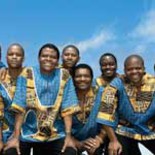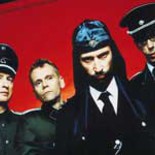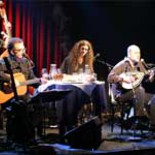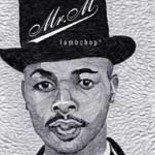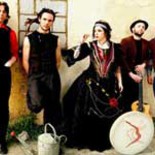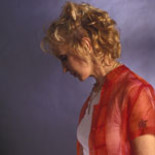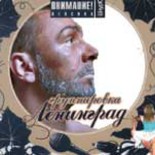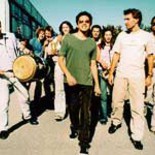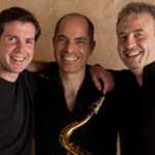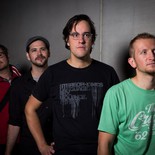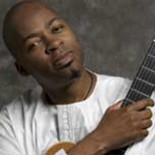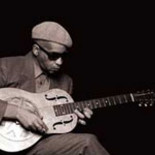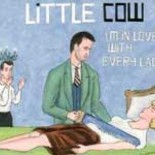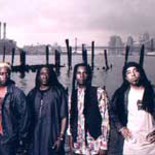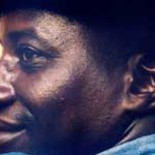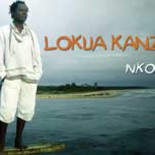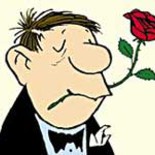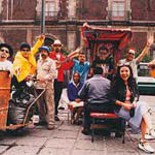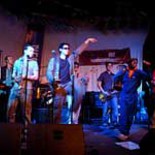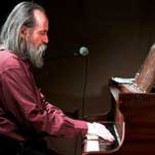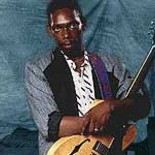Mal gerade knapp Mitte 30, ist Lucky Peterson seit fast drei Jahrzehnten Bühnenprofi. Als er im zarten Alter von sechs Jahren die erste Platte aufnahm, mit einer Cover-Version des James-Brown-Hits „l-2-3-4" als Single-Auskopplung, hatten nicht allein seine Onkels und Tanten ihre helle Freude, sondern auch die Mütter der Nation. Produziert von der Chicagoer Blueslegende Willie Dixon, wurde die Single auf einen Schlag ein Radioerfolg und für Klein-Lucky die Eintrittskarte zu Live-Auftritten in der „Ed Sullivan Show", der „Tonight Show" und wie sie alle heißen. Für ein paar Monate konnte das Land nicht genug bekommen von dem süßen Kleinen mit dem verblüffenden Talent. Da hatte der Dreikäsehoch schon sein halbes Leben lang Schlagzeug gespielt, wußte auf der Hammond B-3 den rechten Ton zu treffen und krähte den Blues in jedes Mikro, an das er heranreichen konnte.
Denn der Blues war Judge Kenneth Peterson in die sprichwörtliche Wiege gelegt worden. Die stand in Buffalo, NY, wo sein Vater, James Peterson, selbst ein Bluesmann, den Live-Club „Governor's Inn" besaß. So gut wie alle Bluesgrößen spielten dort: Jimmy Reed, John Lee Hooker, Muddy Waters, Buddy Guy, Junior Wells ... - von Kindesbeinen an konnte Lucky sie auf und hinter der Bühne erleben. Am meisten faszinierte ihn Bill Doggett mit seiner wuchtigen Hammond-Orgel. Der nahm ihn beim Spielen schon mal auf den Schoß, und bald war Lucky gut genug, nicht nur in der Band seines Vaters einzusteigen, sondern Stars wie Lightnin' Hopkins, Koko Taylor und Jimmy Reed zu begleiten. Nebenher lernte er noch Gitarre, Piano und Baß. Mit fünf Jahren arbeitete er professionell mit Gospelgruppen, und als ihn dann Willie Dixon unter seine Fittiche nahm, war Little Luckys Aufstieg kaum mehr zu bremsen. Als Teenie wurde Peterson Bandleader bei Little Milton, anschließend ging er zu Bobby „Blue" Bland und blieb drei Jahre lang in dessen Band.
Seit 1988 konzentriert er sich auf seine Solokarriere und kann mittlerweile ein halbes Dutzend eigener Alben vorzeigen - von den zahllosen Scheiben anderer Blueskünstler, an denen er zumeist als Organist mitwirkte, ganz zu schweigen. „Lucky Strikes!" und „Triple Play", seine beiden Veröffentlichungen für Alligator, gelten heute als Klassiker des zeitgemäßen Blues.
Unter dem programmatischen Titel „I'm Ready" gab er 1992 seinen Einstand bei Verve und zeigte mit seinem Rock- und Soul-angereicherten Bluesgebräu, daß er in der Tat „bereit" war - für eine Weltkarriere. Klar, Luckys Wiege steht fest in Blues und Gospel, doch seine Paten heißen James Brown und Jimi Hendrix. Den Blues spielt er hart und funky, an der Gitarre rockt er, an der Orgel swingt er wie sein Lehrer, und niemand sollte sich wundern, wenn Lucky auch mal einen Reggae-Rhythmus vorgibt oder eine Nummer von Earth, Wind & Fire, Sting oder Prince ins Programm mischt. Denn für Lucky Peterson ist der Blues kein starres Genre, sondern immer in Bewegung. Und so hat er für sein aktuelles Verve-Album wieder einen passenden Titel gefunden: „Move". Das gilt für den Mann wie für seine Musik.
Aktuelle CD : MOVE (Verve / Gitanes)
------------------------------------------------------------------------
Biography:
Lucky Peterson played his first gig at age three. By the time he was five, he had already recorded his first single, produced by none other than the legendary Willie Dixon. Before Lucky turned six, his career had been propelled into the national spotlight with television appearances on The Ed Sullivan Show, The Tonight Show with Johnny Carson and even What’s My Line?
As a child prodigy, Lucky was somewhat of a novelty act. Now he is a true blues veteran. Over the last three decades, Lucky has played to audiences all over the world, dazzling both fans and critics with his multi-instrumental talents (he plays keyboards, guitar, bass, drums and trumpet), his soulful vocal style and his youthful approach to the blues.
Chicago’s Reader raved, "His musicianship is unassailable…a combination of sleek-handed dexterity and imagination…a happy marriage of blues authenticity and foot-pleasing danceability. This is a young musician of unlimited enthusiasm and nearly unlimited potential having the time of his life and excelling at every stop along the way."
Born Judge Kenneth Peterson in 1963, Lucky was raised on music in his hometown of Buffalo, New York, His father, James Peterson, was a blues singer and owner of the Governor’s Inn, a northern version of a Deep South "chitlin’ circuit" roadhouse club. Artists like Buddy Guy, Junior Wells, Muddy Waters and Koko Taylor played there regularly. Virtually growing up on stage, little Lucky began playing almost before he began talking.
He started on drums, but after hearing the famed Bill Doggett one night, Lucky became fascinated by the huge Hammond B-3 organ. "Bill had a fit trying to keep me from it," recalls Lucky. After some lessons from Doggett and the legendary Jimmy Smith, Lucky focused most of his musical energy on the organ. In his spare time, he also mastered bass and piano, becoming good enough to sit in with his father’s band and back touring artists like Lightnin’ Hopkins and Jimmy Reed. "At first, people wouldn’t believe he could play so well," says James Peterson. "They would think the organ was rigged."
By the time Lucky was five, word of this child prodigy had spread among the blues community. Willie Dixon, a friend of James Peterson, heard little Lucky and produced the boy’s first record, a single entitled 1,2,3,4 and a follow-up album for Chicago’s Today Records. The single hit the airwaves with a bang and the national television appearances followed.
As Lucky continued to grow, he honed his instrumental skills by learning from and jamming with some of the best blues players in the world. When Little Milton’s band came up short an organ player one night, Milton asked the then 17-year-old Lucky to sit in. One gig was all it took for Milton to fall in love with Lucky’s playing. He asked Lucky to join the band permanently. After seven months, Lucky had become Milton’s bandleader. Opening shows with his own 45-minute set on vocals and keyboards, Lucky’s three-year stint with Milton led to an equally long gig with Bobby "Blue" Bland as Bobby’s featured soloist.
During a break in Bobby’s touring schedule, Lucky headed to Europe on a package tour billed as "Young Blues Giants." There he recorded his second career album this time for the French label Isabel Records. In 1988, Lucky left Bland’s touring band, relocated to Florida’s Tampa Bay area and began concentrating on a solo career. His reputation quickly led to regular session work for tiny Florida-based King Snake Records. His funky keyboards sparked Kenny Neal’s Big New From Baton Rouge!!, Rufus Thomas’ That Woman Is Poison! and Lazy Lester’s Harp And Soul, which were all released by the more visible Alligator Records label. In 1989, Alligator released Lucky’s third solo outing, Lucky Strikes! Lucky co-wrote three songs for the album and played all of the keyboard parts and all but one of the guitar solos.
Alligator’s promotion helped to bring Lucky’s music to the attention of radio stations and music critics nationwide. They liked what they heard. Billboard called Lucky "…a prodigy whose raw talent bodes well for his future as a leader." Keyboard said, "Peterson is a 26-year-old blues master." The album received airplay on nearly 200 radio stations nationwide, and Lucky toured the U.S. several times.
Lucky’s next Alligator recording, 1990’s Triple Play, picked up right where Lucky Strikes! left off, again featuring his dynamic organ fills and leads with equal emphasis on his stinging lead guitar and soulful vocals. The material blended straight-ahead blues, Memphis soul and funky grooves that placed Lucky Peterson on the cutting edge of the blues.
Reviews:
"Up-to-date, raw-edged blues…unassailable musicianship, passion and conviction."
—Chicago Reader
"Jumping, rocking blues…Peterson is a triple-threat player, excelling on guitar, piano and especially Hammond organ."
—Washington Post
